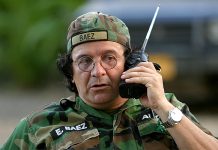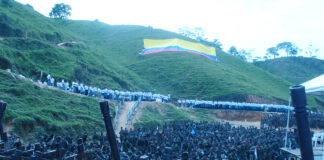The First Court of the Execution of Sentencing received a document from the Superior Court of Manizales which stated that the sentence against the Israeli mercenary Yair Klein has expired.
 |
|
| Yair Klein, an Israeli mercenary. Photo: Semana |
A judge of the execution of sentencing of Manizales ruled that the jail sentence of Israeli mercenary Yair Klein had expired and therefore canceled the international arrest warrant that has existed for more than 10 years.
The case began in February when a court in Manizales ruled that the full sentence had not been completed, overruling the petition of Flavio Amador Cortés Delgado, Klein’s lawyer. The court indicated that the sentence began on Oct. 10, 2001 and would end on June 10.
In 2002 the Superior Court of Manizales sentenced Klein to 10 years and 8 months in prison and to pay a fine of 22 times the minimum salary for his participation in the strengthening of war practices of paramilitary groups. Although he was never captured, it seems that his history with Colombia has ended.
Cortés Delgado therefore filed an administrative appeal on June 10, the day that Klein would have finished his sentence had he been extradited to Colombia.
The Mercenary who Came to Train the Paramilitaries
According to a report by Semana magazine, Klein began his military career as an adolescent, like many of his compatriots. His merits led him to be selected to the army´s special assault groups, and it was there that he learned the military defense secrets of his country and participated in such daring actions as the 1972 rescue of dozens of hostages from a Libyan plane in the Ben Gurion International Airport in Tel Aviv. Yair and his gunmen took only six and a half seconds to enter the plane and neutralize the terrorists.
Many of his later actions were of the same nature; however, at just 36 years of age, Yair decided to leave the army and dedicate himself to business. He attempted to start a gas station, and later a restaurant, but both projects failed.
He understood then that peace was not his business, and enlisted in his country’s Armed Forces. He became the commander of a battalion and an infantry brigade that fought in the Lebanese War. His second military experience lasted until 1983, when he joined the ranks of nearly 100 reserve officers and with many of them created his own security consulting firm, the Halanit Hod, a medium-sized business that worked out of an office in Tel Aviv.
The decision to combine military knowledge with business is common in a country such as Israel, with obligatory military service. “If you take a guy who grows up on a farm and then goes to the army, when he leaves, he knows two things: how to cultivate tomatoes and warfare,” said Aharon Klieman, professor of political science at Tel Aviv University. “There is much more money in warfare.”
Halanit Hod´s first client was a contact from the Lebanese conflict, the Christian Phalange Militia, the group responsible for the massacres of refugee camps in Sabra and Shatila. “The Phalanges needed belts, helmets and personal equipment,” Klein said.
The business was substantial. He received two million dollars for the sale of weapons and equipment. From then on, he dedicated himself to teaching and promoting the art of war throughout the world. He arrived in Colombia and helped to form the seed of a monster that would over time spread blood throughout the country. He later left and reappeared on a television program, avoiding capture until his recent arrest in Russia, from where he should be extradited to Colombia to respond for his bloody actions.
Klein´s story is that he came in 1987 so that the police would contract his business, Spearhead, to train its members in defense and personal security. He said that in that first trip he had an interview with Police Chief Carlos Arturo Casadieog and with representatives of the business Atlas Security. In 1988 and 1989 he made more visits to Colombia “because it was when they hired me to teach courses in Puerto Boyacá,” he said in a 2002 interview with Semana.
When he arrived, he attended a meeting “with some farmers of Acdegam who were besieged by guerrillas. And so I began to prepare groups for self-defense. They were farmers and peasants who couldn´t take more of the guerrillas,” he said. The Army was not capable of defending them, so he decided to take the issue of security into his own hands. According to Klein, the training was strictly in military and defense matters and had nothing to do with criminal acts.
But the truth is that Klein, along with Israeli and British mercenaries, was contracted in the 1980s to train Colombian paramilitary groups and drug trafficking militias. On the program “Meet the Press,” of the station Caracol, he criticized Rodríguez Gacha and Pablo Escobar, among others.
In an interview on the movement of the paramilitaries, he stated: “It´s shameful and a lack of leadership to crack down on the paramilitaries without being finished with the guerrillas. This foreign pressure exists because the Colombian government is too stupid to do it.”
In his statements on the program, Klein warned that he would return to Colombia if it were necessary to fight the guerrillas, since it was the important task which brought him to the country in 1987 and that had not yet been completed. He would return, he said, to exterminate the guerrillas and because “the best chapter of my life was my time in Colombia.”
The mercenary said that he regretted not being able to do more to achieve that goal and that the cause of the war was valid then and would continue to be. As to how he maintained his support upon arriving in Colombia, he confirmed that his first contactwas with the government.
Although Klein was detained in August 2007 in the Moscow Airport, and although the Foreign Ministry requested his extradition to Colombia, he was instead deported to Israel.
In Colombia, the mercenary was sentenced to 14 years in prison on Feb. 23, 2001 by the Special Judicial Criminal Circuit of Manizales, but the defense appealed the decision. On June 22, 2001 the Penal Division of the Superior Court of Manizales fixed the sentence at 10 years and 8 months in prison. With this decision, if he wanted, Klein could return to the country and avoid capture, given that the processes against him have ended.
In an interview with RCN News in Bogotá, Cortés Delgado said that, “having been convicted and having paid the sentence in hiding, he comes to enjoy his freedom immediately, as it states in the ruling upheld by the Court.”











